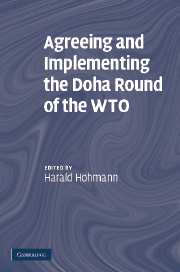Book contents
- Frontmatter
- Contents
- List of Contributors
- Foreword
- Introduction
- The future of the Doha Round
- PART ONE Development policy of the WTO
- PART TWO Trade policy (including competition) and trade facilitation
- PART THREE Reform of the dispute settlement system
- PART FOUR Social rights, health, and environment
- 15 Trade and human rights at work: Next round please …? Regulatory and cooperationist approaches in the context of the Doha Round
- 16 Food safety issues under WTO Agreements
- 17 Trade and the environment: With particular reference to climate change issues
- 18 Live with a quiet but uneasy status quo? An evolutionary role the appellate body can play in resolution of ‘trade and environment’ disputes
- 19 Health, environment and social standards in the Doha Round: Comparison of visions and reforms needed and the results achieved
- PART FIVE Conclusions
- Index
17 - Trade and the environment: With particular reference to climate change issues
from PART FOUR - Social rights, health, and environment
Published online by Cambridge University Press: 23 February 2010
- Frontmatter
- Contents
- List of Contributors
- Foreword
- Introduction
- The future of the Doha Round
- PART ONE Development policy of the WTO
- PART TWO Trade policy (including competition) and trade facilitation
- PART THREE Reform of the dispute settlement system
- PART FOUR Social rights, health, and environment
- 15 Trade and human rights at work: Next round please …? Regulatory and cooperationist approaches in the context of the Doha Round
- 16 Food safety issues under WTO Agreements
- 17 Trade and the environment: With particular reference to climate change issues
- 18 Live with a quiet but uneasy status quo? An evolutionary role the appellate body can play in resolution of ‘trade and environment’ disputes
- 19 Health, environment and social standards in the Doha Round: Comparison of visions and reforms needed and the results achieved
- PART FIVE Conclusions
- Index
Summary
Introduction
The Doha Declaration addresses the issue of ‘Trade and the Environment’ in paragraph 31, which states as follows:
(i) [The] relationship between existing WTO rules and specific trade obligations set out in multilateral environmental agreements, negotiations limited in scope to the applicability of such existing WTO rules as among parties in question. The negotiations shall not prejudice the WTO rights of any Member that is not a party to the MEA in question.
(ii) Procedures for regular information exchange between MEA Secretariats and the relevant WTO committees, and the criteria for granting of observer status.
(iii) The reduction or, as appropriate, elimination of tariff and non-tariff barriers to environmental goods and services.
To the disappointment of many of the experts in the field, the Declaration has defined the scope of negotiation so narrowly by limiting to the relationship between WTO and MEAs (multilateral environmental agreements) only in such cases where the countries concerned are parties to both WTO and MEA. In other words, the paragraph does not cover the cases where one of the countries is not a party to a MEA, such as the United States or Australia in relation to the Kyoto Protocol on climate change.
Nonetheless, it would be a great step forward if the Doha Round successfully reaches an agreement in formulating a viable scheme for the coordination between trade rules and the rules for the environment even in a limited way, since it will certainly have a favourable effect on resolving the issues, perhaps by way of analogy, among the WTO members involving non-parties to a MEA.
Information
- Type
- Chapter
- Information
- Agreeing and Implementing the Doha Round of the WTO , pp. 391 - 419Publisher: Cambridge University PressPrint publication year: 2008
